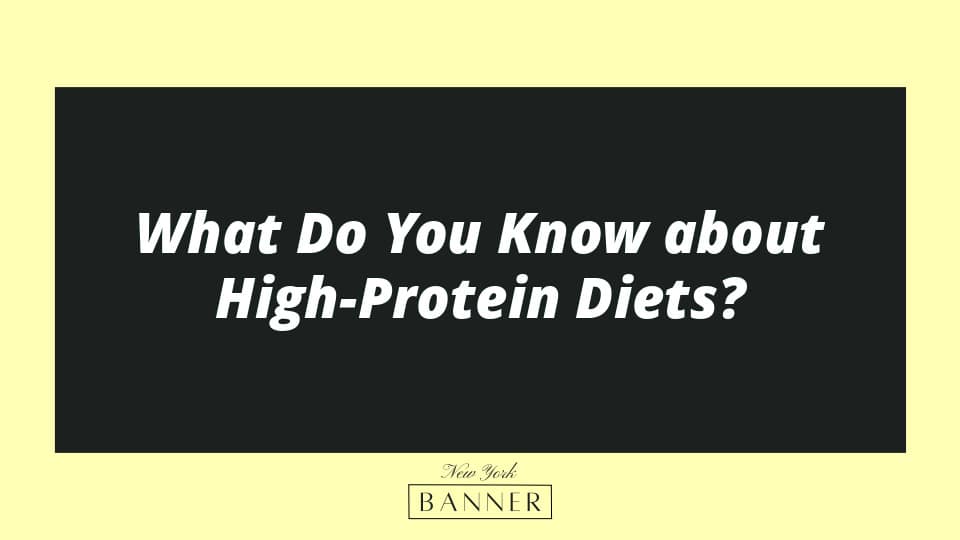Whether you like to get your muscles toned or trying to lose weight, a high-protein diet can be a great companion on this journey. Protein is an important macronutrient. It is a major fuel source for many bodily processes. Once it is ingested by the body, it aids as fuel and it builds and recovers muscle mass. When we become deficient in protein, we experience a depletion of muscle mass.
How High-Protein Diets Work
You can enjoy several benefits from a high-protein diet, from feeling satiated for a longer period to the absence of food cravings. This is why it is so effective to increase your protein intake when it comes to weight loss. It also has an important role in muscle recovery and the increase of muscle mass.
Food-based proteins are known for being longer to digest as opposed to refined carbohydrates. This is particularly true when it comes to the protein found in dairy called casein, which digests at a much slower rate.
A high-protein diet is also seen as contributing to the prevention of chronic conditions by maintaining a lower blood glucose level. Plant-based proteins are especially known to provide us with this benefit. Other conditions that protein is known to reduce are diabetes, insulin resistance, and cardiovascular diseases.
Is a High Protein Diet Helpful with Weight Loss?
Since protein takes longer to digest, it will make you feel full for a longer period, helping you to manage your hunger well. When you follow a high-protein diet, make sure that you don’t miss out on other nutrients that your body needs just for you to reduce calories. This type of diet is also not sustainable for a long time.
The use of glycogen and water loss
Glycogen is the storage form of carbohydrates in the body. This is located mainly in your muscles and liver. Carbohydrates are stored by the body until they are needed. Glycogen attracts and binds water. In a high-protein diet, the water uses glycogen and the water that is linked to it. This leads to reduced scale weight.
Protein’s diuretic effect
Your protein need depends on your level of activity. The more active you get, the more protein you need to support the activity. Protein is one of the nutrients that have no other benefit than fulfilling the body’s physiological requirements. The building blocks of proteins called amino acids contain nitrogen. Excess nitrogen turns into ammonia which is converted into toxic urea which comes out of the body as urine. This diuretic effect may contribute to a reduced scale weight.
The Amount of Protein I Should Eat
To maintain overall body health and a healthy lifestyle, it’s crucial that we consume 1 to 1.5 grams of protein for every kilogram of body weight. You can calculate it as such: your weight x (1g to 1.5g) = the total target of protein daily for muscle development.
For those individuals who are more physically active, it is recommended that they consume 1.6 to 2.2 grams of protein x their body weight every day. This will ensure muscle recovery.
How to Consume Protein the Entire Day
The total amount of protein our body should receive following the calculation above must be divided into 4 servings daily such as breakfast, lunch, mid-afternoon snack, and dinner. Whatever protein source you have, make sure that you include one for every meal and snack.
What Is the Best Source of Protein?
When we assess protein quality, we tend to look into how easily protein is absorbed by the body. This is called bioavailability. Various protein sources are absorbed at different rates by the body. Researchers have seen that animal-based sources absorb better than plant-based sources. It’s more convenient now that there are many available plant-based protein sources that meet the daily per-serve requirement of proteins.
What Science Says about High-Protein Diets
According to scientific evidence, instead of the total amount of protein in your diet, you must be more concerned about the type of protein that you consume when you’re after long-term health. Research suggests that consuming a large amount of red meat is associated with higher risks of cancer, diabetes, heart disease, and early death. However, such foods can be replaced with other sources of protein like legumes, nuts, seeds, and fish.
Research also revealed that in terms of weight loss, what’s important is not the amount of protein consumed but the protein source. Researchers observed that people who consume leaner and plant-based protein sources have experienced better weight loss outcomes than those who consumed processed meat and red meat, full-fat cheese, and chicken with skin.
Who Benefits More from a High-Protein Diet?
A doctor, health practitioner, or dietitian may recommend a high-protein diet for several reasons. One of these is to enhance athletic performance. Medical experts may also recommend a high-protein diet for various medical reasons such as for those who are under treatment for cancer and those who require wound healing. People who undergo dialysis treatment may also need a high-protein diet since dialysis filters body protein together with other body wastes. Older adults may also be advised to follow a high-protein diet to maintain muscle mass, which may decline with age.
Are High-Protein Diets Safe?
High protein content will not hurt you unless you have a pre-existing kidney problem. Anyone who has diabetes especially when it is not managed well must undergo nephropathy before they consider increasing their protein intake. Diets with very high protein content may induce ketosis which if maintained for a long time may make the blood more acidic and also absorb calcium from the bones to retain the pH balance.
Good Sources of Protein
The following are some examples of foods that are good sources of protein: black beans, beef, chicken, chickpeas, cottage cheese, cashew butter, hemp seeds, lentils, eggs, pumpkin seeds, tempeh, tofu, yogurt, spirulina, salmon, peanut butter, and others.

